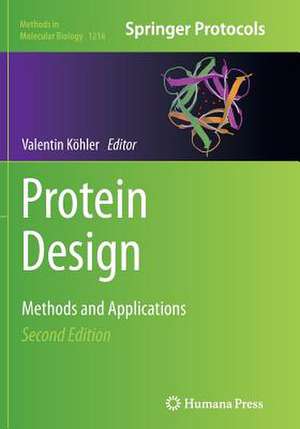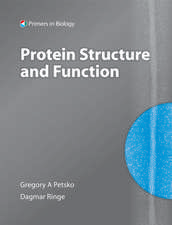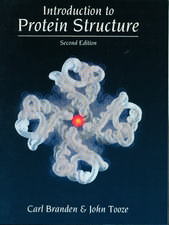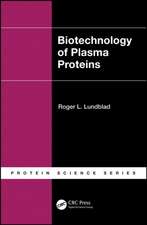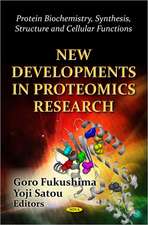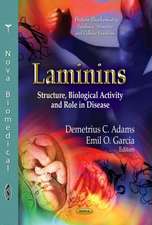Protein Design: Methods and Applications: Methods in Molecular Biology, cartea 1216
Editat de Valentin Köhleren Limba Engleză Paperback – 17 sep 2016
Thorough and intuitive, Protein Design: Method and Applications, Second Edition provides a number of practical protocols and instructive reviews to aid in the creation of new experiments.
| Toate formatele și edițiile | Preț | Express |
|---|---|---|
| Paperback (1) | 700.10 lei 43-57 zile | |
| Springer – 17 sep 2016 | 700.10 lei 43-57 zile | |
| Hardback (1) | 955.08 lei 43-57 zile | |
| Springer – 11 sep 2014 | 955.08 lei 43-57 zile |
Din seria Methods in Molecular Biology
- 9%
 Preț: 791.63 lei
Preț: 791.63 lei - 23%
 Preț: 598.58 lei
Preț: 598.58 lei - 20%
 Preț: 882.98 lei
Preț: 882.98 lei -
 Preț: 252.05 lei
Preț: 252.05 lei - 5%
 Preț: 802.70 lei
Preț: 802.70 lei - 5%
 Preț: 729.61 lei
Preț: 729.61 lei - 5%
 Preț: 731.43 lei
Preț: 731.43 lei - 5%
 Preț: 741.30 lei
Preț: 741.30 lei - 5%
 Preț: 747.16 lei
Preț: 747.16 lei - 15%
 Preț: 663.45 lei
Preț: 663.45 lei - 18%
 Preț: 1025.34 lei
Preț: 1025.34 lei - 5%
 Preț: 734.57 lei
Preț: 734.57 lei - 18%
 Preț: 914.20 lei
Preț: 914.20 lei - 15%
 Preț: 664.61 lei
Preț: 664.61 lei - 15%
 Preț: 654.12 lei
Preț: 654.12 lei - 18%
 Preț: 1414.74 lei
Preț: 1414.74 lei - 5%
 Preț: 742.60 lei
Preț: 742.60 lei - 20%
 Preț: 821.65 lei
Preț: 821.65 lei - 18%
 Preț: 972.30 lei
Preț: 972.30 lei - 15%
 Preț: 660.49 lei
Preț: 660.49 lei - 5%
 Preț: 738.41 lei
Preț: 738.41 lei - 18%
 Preț: 984.92 lei
Preț: 984.92 lei - 5%
 Preț: 733.29 lei
Preț: 733.29 lei -
 Preț: 392.60 lei
Preț: 392.60 lei - 5%
 Preț: 746.26 lei
Preț: 746.26 lei - 18%
 Preț: 962.66 lei
Preț: 962.66 lei - 23%
 Preț: 860.22 lei
Preț: 860.22 lei - 15%
 Preț: 652.64 lei
Preț: 652.64 lei - 5%
 Preț: 1055.50 lei
Preț: 1055.50 lei - 23%
 Preț: 883.87 lei
Preț: 883.87 lei - 19%
 Preț: 491.89 lei
Preț: 491.89 lei - 5%
 Preț: 1038.86 lei
Preț: 1038.86 lei - 5%
 Preț: 524.16 lei
Preț: 524.16 lei - 18%
 Preț: 2122.34 lei
Preț: 2122.34 lei - 5%
 Preț: 1299.23 lei
Preț: 1299.23 lei - 5%
 Preț: 1339.12 lei
Preț: 1339.12 lei - 18%
 Preț: 1390.26 lei
Preț: 1390.26 lei - 18%
 Preț: 1395.63 lei
Preț: 1395.63 lei - 18%
 Preț: 1129.65 lei
Preț: 1129.65 lei - 18%
 Preț: 1408.26 lei
Preț: 1408.26 lei - 18%
 Preț: 1124.92 lei
Preț: 1124.92 lei - 18%
 Preț: 966.27 lei
Preț: 966.27 lei - 5%
 Preț: 1299.99 lei
Preț: 1299.99 lei - 5%
 Preț: 1108.51 lei
Preț: 1108.51 lei - 5%
 Preț: 983.76 lei
Preț: 983.76 lei - 5%
 Preț: 728.16 lei
Preț: 728.16 lei - 18%
 Preț: 1118.62 lei
Preț: 1118.62 lei - 18%
 Preț: 955.25 lei
Preț: 955.25 lei - 5%
 Preț: 1035.62 lei
Preț: 1035.62 lei - 18%
 Preț: 1400.35 lei
Preț: 1400.35 lei
Preț: 700.10 lei
Preț vechi: 823.64 lei
-15% Nou
Puncte Express: 1050
Preț estimativ în valută:
133.98€ • 139.36$ • 110.61£
133.98€ • 139.36$ • 110.61£
Carte tipărită la comandă
Livrare economică 14-28 aprilie
Preluare comenzi: 021 569.72.76
Specificații
ISBN-13: 9781493944088
ISBN-10: 1493944088
Pagini: 279
Ilustrații: X, 279 p. 76 illus., 55 illus. in color.
Dimensiuni: 178 x 254 mm
Greutate: 0.51 kg
Ediția:Softcover reprint of the original 2nd ed. 2014
Editura: Springer
Colecția Humana
Seria Methods in Molecular Biology
Locul publicării:New York, NY, United States
ISBN-10: 1493944088
Pagini: 279
Ilustrații: X, 279 p. 76 illus., 55 illus. in color.
Dimensiuni: 178 x 254 mm
Greutate: 0.51 kg
Ediția:Softcover reprint of the original 2nd ed. 2014
Editura: Springer
Colecția Humana
Seria Methods in Molecular Biology
Locul publicării:New York, NY, United States
Cuprins
De novo Design of Stable α-helices.- Design of Monomeric Water-soluble b-hairpin and β-sheet Peptides.- Combination of Theoretical and Experimental Approaches for the Design and Study of Fibril-forming Peptides.- Posttranslational Incorporation of Non-canonical Amino Acids in the RNase S System by Semisynthetic Protein Assembly.- Design, Synthesis, and Study of Fluorinated Proteins.- High-Quality Combinatorial Protein Libraries Using the Binary Patterning Approach.- Methods for Library-Scale Computational Protein Design.- Symmetric Protein Architecture in Protein Design: Top-Down Symmetric Deconstruction.- Identification of Protein Scaffolds for Enzyme Design using Scaffold Selection.- Computational Design of Novel Enzymes without Cofactors.- De novo Design of Peptide Scaffolds as Novel Pre-organised Ligands for Metal-ion Coordination.- Computational Design of Metalloproteins.- Incorporation of Modified and Artificial Cofactors into Naturally Occurring Protein Scaffolds.- Computational Redesign of Metalloenzymes for Catalyzing New Reactions.
Textul de pe ultima copertă
Protein Design: Method and Applications, Second Edition expands upon the previous edition with current, detailed ideas on how to approach a potential protein design project. With new chapters on metals as structure-forming elements and functional sites, the design and characterization of fluorinated proteins, top-down symmetric deconstruction and the design of protein libraries and novel or repurposed enzymes. Written in the highly successful Methods in Molecular Biologyseries format, chapters include introductions to their respective topics, lists of the necessary materials and reagents, step-by-step, readily reproducible laboratory protocols, and tips on troubleshooting and avoiding known pitfalls.
Thorough and intuitive, Protein Design: Method and Applications, Second Edition provides a number of practical protocols and instructive reviews to aid in the creation of new experiments.
Thorough and intuitive, Protein Design: Method and Applications, Second Edition provides a number of practical protocols and instructive reviews to aid in the creation of new experiments.
Caracteristici
Includes ideas on how to approach a potential protein design project Provides step-by-step detail essential for reproducible results Contains key notes and implementation advice from the experts
